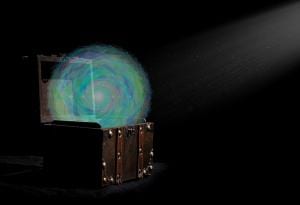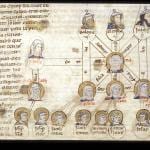
We often like to get in routines. Even our worship can get caught up in them. This is not to say ritual worship with its routines is wrong – there is much value to it, and it is a legitimate and indeed invaluable way to engage God. Liturgy is an important way to have communal worship of God. However, we must not think God is limited to such engagements. We must not limit the way we worship God, for God is not to be bound by us. We can never limit God with a box.
Everywhere we go, God is there; everywhere we go, we have the opportunity to dialogue with God, to worship God, to listen to God, indeed, to be moved by God. Everywhere we go can be holy ground. Everywhere we go can be sanctified and bring to us the presence of God, but only if we let it. If we try to restrict God, pushing God aside by limiting where the divine presence can be found, we not only risk losing sight of God, we effectively put up a false representation of God, replacing God with an immobile, impotent idol which only has the power which we give it.
Abba Daniel, one of the Desert Fathers, understood this, and so understood that wherever he was at, God could be found. He did not need to go into his cell to find God. He knew that he did not need to abandon the world, to hide from it in order to experience God:
One day Abba Daniel and Abba Ammoes went on a journey together. Abba Ammoes said, ‘When shall we, too, settle down, in a cell, Father?’ Abba Daniel replied, ‘Who shall separate us henceforth from God? God is in the cell, and, on the other hand, he is outside also.’[1]
The Desert Fathers got used to meeting with God in the privacy of their cells; for some, that led them to believe that the only proper place for them to encounter God was in the empty space of their cell. They did not understand the point of their ascetic labors. It was not to distance themselves from the world. It was a tool which could be embraced to help them purify themselves, to awaken their spiritual senses as it were, so that they can truly experience God wherever they are at. The cell made things simple, so they would not be distracted as they tried to turn their life into a life of constant prayer. The point of their asceticism was to find a way to connect with God. But once they did so, and they found themselves engaging God in their cell, they should learn from that experience, and adapt it so that God could be experienced wherever they were, and in whatever activity they found themselves doing. To hide away in their cell after they had learned what they needed to learn from it turned the cell into a spiritual prison, instead being what it should be, a laboratory of spiritual transformation.
The sacraments are invaluable, but we must not limit the Christian life to their reception, thinking that is all we need to do in order to be good, faithful followers of Christ. When asked about salvation, Jesus didn’t say “Just partake of the sacraments and you will be saved.” Yes, he told people to be born again (baptized), he told others they needed to receive the bread of life, but he also told people to repent, to change their ways, to look after the poor and needy, to care of those in need, to go out into the world and not hide from it. God is not bound by the sacraments, and the Christian life, likewise, should not be seen as limited to them. To be good and faithful followers, we need to do more than open up our mouth and receive communion, we need to open up our hearts and spread the grace of that communion into the world, helping to sanctify the world around us. When we cannot receive the sacraments, just like when Ammoes could not be in his cell, we should not find ourselves being at a loss as to how we can worship and please God. We should know the kingdom of God is beside us, indeed, within, and that wherever we are at, we can praise God and act in accordance to his wishes. The sacraments provide us important graces which we need, but, as Christian history also shows, we do not need to be constantly receiving them to worship God. After all, many traditional services, such as Vespers, normally have no sacraments associated with them at all.
Do we listen to Jesus? Do we truly listen to him, or do we try to limit him based upon the few ways which we have come to know him? Do we pay attention to the Gospel and the message within, or do we try to limit it to a few elements found within them, ignoring the rest, thinking they are unnecessary? If we truly paid attention we would learn not to put God in a box; we would find a way to engage God wherever we are at, knowing that God is there too. God is with us. God is always with us. God is not stuck in a box away from us. God likewise, doesn’t want us to be stuck in a box. God wants us to act, to be people of action. God wants us to do more than proclaim the kingdom of God, God wants us to realize it in its fullness. We can be with God wherever we are at, being faithful Christians, even if we find our normal routines are disrupted for one reason or another. If we think we can’t, we have yet to realize what it means to be a Christian, because we have not understood who God is.
[1] The Sayings of the Desert Fathers. Trans. Benedicta Ward (Kalamazoo, MI: Cistercian Publications, 1984),52 [Abba Daniel 5].
Stay in touch! Like A Little Bit of Nothing on Facebook.
If you liked what you read, please consider sharing it with your friends and family!













